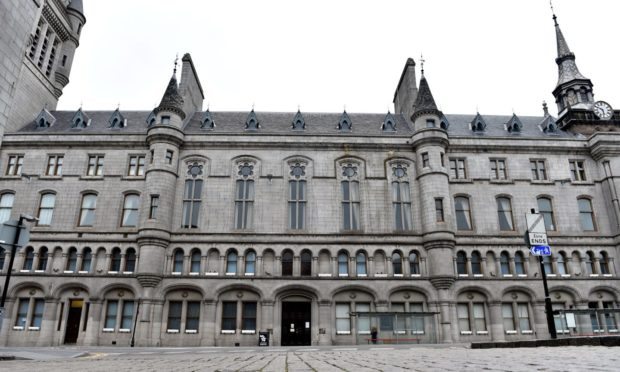Solictors have hit out over the backlog of cases, as courts prepare to increase the amount of business heard from next week.
Courts across Scotland have been badly affected by the Covid pandemic and have struggled to adapt to restrictions such as social distancing while trying to deal with as much business as possible.
It has now been announced that, as of next week, new summary cases in which an accused person has received a citation to appear in court, will resume, and summary trial business will revert to pre-January levels, before restrictions were tightened.
But Aberdeen solicitors have had a mixed reaction to the news, and called on the Scottish Government to do more.
Ian Woodward-Nutt
Ian Woodward-Nutt, of Woodward Lawson, said: “The Scottish Courts announcement is little more than token window dressing.
“Members of the public would be understandably horrified if they fully understood the gross delays that will have to be endured in summary cases that are destined to proceed to trials.
“The lock jams in the system are likely to be endured for many years, and in no small part are due to repeated cuts in budgets and court closures over the years running up to the pandemic.
“One of the few truly unique fundamental pillars of Scottish society is our distinct criminal justice system. Isn’t it ironic, therefore, that it should be an SNP-run government that has single-handedly undertaken to decimate criminal justice in Scotland.”
SCTS chief executive Eric McQueen
In addition to new summary cases and summary trials changing, plans are also in place for Justice of the Peace Courts to re-start all business on June 7.
Scottish Courts and Tribunals Service (SCTS) chief executive Eric McQueen said: “The safety of staff, judiciary and court users remains our top priority and is central to our plans to safely resume court business on April 19.
“Based on the latest Covid data, we are taking a cautious approach to restore summary criminal business to pre-January lockdown levels, in line with the wider phased easing of restrictions announced by the Scottish Government.
“We will continue to be guided by public health advice and to monitor case levels. The extensive measures we have in place to ensure the safest possible working environment will be maintained, to minimise potential transmission so the courts can continue to operate safely.”
Liam Mcallister
Defence solicitor Liam Mcallister, a partner at Lefevre Litigation, said: “Of course it’s a welcomed and positive update for everyone, that the courts are going to be returning to ‘normal’. However, what will the new normal be?
“Inevitably, the only way to tackle the sizeable backlog is proper funding, and proper investment to all, as the inequality of arms remains huge in our criminal justice system.
“Those accused and those defending them need the same leave of input and investment and support as those investigating and prosecuting. It’s just a basic question of fairness.
“It’s worthy of note that the backlog of cases isn’t new – it isn’t just a Covid-creation. It existed already due to a lack of resources and funding in our courts, and that’s even in spite of the extraordinary efforts and hard work of court staff and court users.
“As always we will fight as hard as we can for our clients and their rights, but the system was close to breaking point long before coronavirus changed the world.”
SNP
An SNP spokesman said: “Due to the pandemic, there is now a significant backlog of criminal cases – like elsewhere in the UK – and with the ongoing physical distancing restrictions, cases are taking longer to come to trial and the number of people held on remand has increased.
“We supported the recovery element of this programme by £50 million funding in last month’s budget.
“The Scottish Government has worked closely with the legal profession from the outset of the pandemic and has opened a £9 million Covid-19 resilience fund for legal aid firms and law centres.
“This fund forms part of a wider package of support for the legal aid sector worth up to £20 million.”
A Scottish Government spokesman said the £50 million would support the Recover, Renew, Transform programme for the criminal justice system.
Scottish Courts and Tribunals Service
A SCTS spokesman said the pandemic had had a “significant impact” on the backlog of trials.
He said: “The introduction of ground-breaking remote jury centres has enabled solemn capacity in both the High Court and Sheriff Courts to return to pre-Covid-19 levels. As restrictions continue to ease, from April 19 the volume of Sheriff Court summary trials will increase, with Justice of the Peace trials re-starting from June 7.
“In order to support the court recovery programme and commence work to reduce case backlogs, some £50 million of cross-justice system funding has been made available to provide the necessary resources for the courts, COPFS, Legal Aid, police, Community Justice, prisons and third sector support services over the coming year.”
A recovery programme set to commence in September will see four additional high courts, two new sheriff solemn courts and up to 10 new summary courts.
Mr McQueen said: “Collaboration across the whole justice system has already returned both the High Court and Sheriff Court jury trials to pre-Covid capacity, which is an incredible achievement.
“As lockdown restrictions ease, our attention is focussed on returning summary criminal business to pre-Covid levels and tackling the backlogs across all courts which impact on complainers, witnesses and the accused.
“These are important steps and we are moving quickly to prepare for additional courts, with the aim of starting the recovery programme in September 2021.
“At all times safety for everyone in our courts and remote jury centres will remain our top priority and the pace of the recovery programme must be aligned to continued progress on vaccination and Covid transmission rates.”
